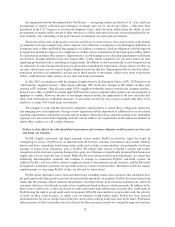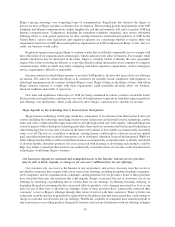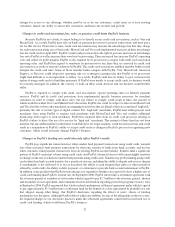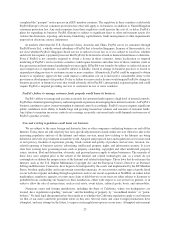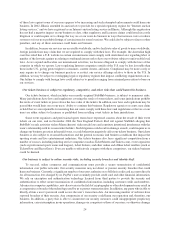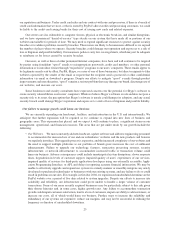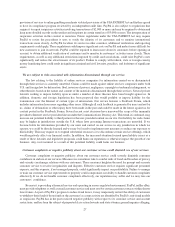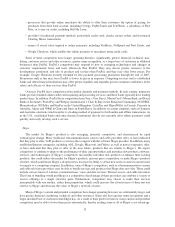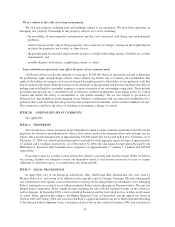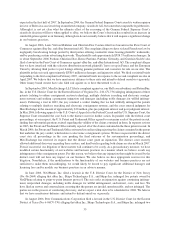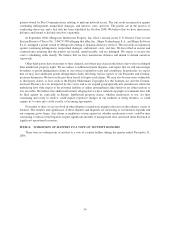eBay 2006 Annual Report Download - page 30
Download and view the complete annual report
Please find page 30 of the 2006 eBay annual report below. You can navigate through the pages in the report by either clicking on the pages listed below, or by using the keyword search tool below to find specific information within the annual report.•Customer Account Billing. Our revenues depend on prompt and accurate billing processes. Problems with
our conversion to a new billing system during the second and third quarters of 2004 caused incorrect account
balance totals to be displayed for some users. While these problems have been corrected and we believe that
no users were overcharged, our failure to grow our transaction-processing capabilities to accommodate the
increasing number of transactions that must be billed on any of our websites would harm our business and
our ability to collect revenue.
•Customer Support. We are expanding our customer support operations to accommodate the increased
number of users and transactions on our websites and the increased level of user protection activity we
provide worldwide. If we are unable to provide these operations in a cost-effective manner, users of our
websites may have negative experiences, current and future revenues could suffer, and our operating margins
may decrease.
We must continue to hire, train, and manage new employees at a rapid rate. If our new hires perform poorly, if
we are unsuccessful in hiring, training, managing, and integrating these new employees, or if we are not successful
in retaining our existing employees, our business may be harmed. To manage the expected growth of our operations
and personnel, we will need to improve our transaction processing, operational and financial systems, procedures,
and controls. This is a special challenge as we acquire new operations with different systems. Our current and
planned personnel, systems, procedures, and controls may not be adequate to support our future operations. The
additional headcount and capital investments we are adding increase our cost base, which will make it more difficult
for us to offset any future revenue shortfalls by expense reductions in the short term.
Use of our services for illegal purposes could harm our business.
The law relating to the liability of providers of online services for the activities of their users on their service is
currently unsettled in the United States and internationally. We are aware that certain goods, such as weapons, adult
material, tobacco products, alcohol, and other goods that may be subject to regulation, have been listed and traded
on our service. We may be unable to prevent our users from selling unlawful goods or selling goods in an unlawful
manner, and we may be subject to allegations of civil or criminal liability for unlawful activities carried out by users
through our service. We have been subject to several lawsuits based upon such allegations. In December 2004, an
executive of Baazee.com, our Indian subsidiary, was arrested in connection with a user’s listing of a pornographic
video clip on that site. Similarly, our Korean subsidiary and one of its employees were found criminally liable for
listings on the Korean subsidiary’s website. In order to reduce our exposure to this liability, we have prohibited the
listing of certain items and increased the number of personnel reviewing questionable items. In the future, we may
implement other protective measures that could require us to spend substantial resources or discontinue certain
service offerings. Any costs incurred as a result of potential liability relating to the sale of unlawful goods or the
unlawful sale of goods could harm our business. In addition, we have received significant and continuing media
attention relating to the listing or sale of unlawful goods using our services. This negative publicity could damage
our reputation and diminish the value of our brand names. It also could make users reluctant to continue to use our
services.
PayPal’s payment system is also susceptible to potentially illegal or improper uses. These may include illegal
online gambling, fraudulent sales of goods or services, illicit sales of prescription medications or controlled
substances, piracy of software and other intellectual property, money laundering, bank fraud, child pornography
trafficking, prohibited sales of alcoholic beverages or tobacco products, and online securities fraud. PayPal’s
acceptable use policy enables PayPal to fine users in certain jurisdictions up to $500 or take legal action to recover
its losses for certain violations of that policy, including online gambling and illegal sales of prescription
medications. Despite measures PayPal has taken to detect and lessen the risk of this kind of conduct, illegal
activities could still be funded using PayPal.
PayPal is subject to anti-money laundering laws and regulations that prohibit, among other things, its
involvement in transferring the proceeds of criminal activities. Although PayPal has adopted a program to comply
with these laws and regulations, any errors or failure to implement the program properly could lead to lawsuits,
administrative action, and prosecution by the government. In July 2003, PayPal agreed with the U.S. Attorney for
the Eastern District of Missouri that it would pay $10 million as a civil forfeiture to settle allegations that its
26




